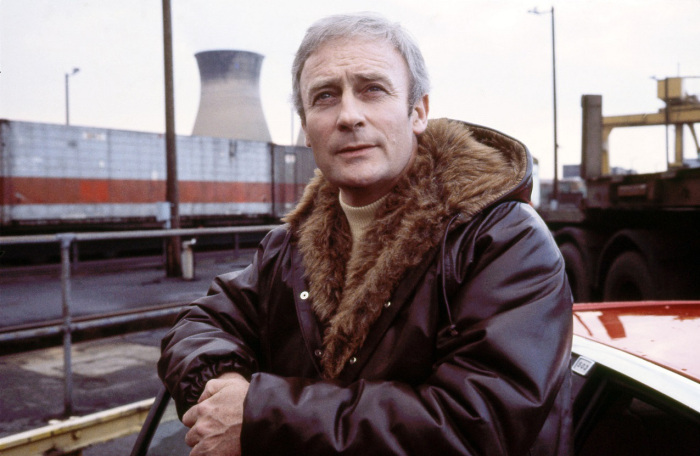Dystopian futures were all the vogue on British television in the 1970s. Everything from The Guardians (1971) to Terry Nation’s post-apocalyptic Survivors (1975-1977), from episodes of children’s shows like The Tomorrow People (1973-1979) to hit space opera Blake’s 7 (1978-1981) and more Plays for Today (1970-1984) and Tomorrow (1982) than you can shake a stick at took a jaundiced view of our possible futures. One of the BBC’s most ambitious such undertakings was Wilfred Greatorex‘s 1990 which ran for two series between 18 September 1977 and 10 April 1978.
Edward Woodward stars as journalist Jim Kyle on the last independent newspaper left in the country, The Star. The Britain he reports on is under the tyrannical heel of the Home Office’s Public Control Department (PCD), an oppressive bureaucracy that has risen to power on the back of a huge financial disaster. Civil liberties are a thing of the past, draconian laws punish everything from the most petty to the most serious of crimes with the same severity and dissidents are confined to “Adult Rehabilitation Centres.”

Kyle decides to make a stand and fight back against the PCD, headed by Controller Herbert Skardon (Robert Lang) while becoming romantically involved with PCD Deputy Controller Delly Lomas (Barbara Kellerman) – the second series saw the return of Lynn Blake (Lisa Harrow), Kyle’s former lover, and along the way he’s aided by fellow dissidents Dave Brett (Tony Doyle) and mysterious government informer “Faceless” (Paul Hardwick).
Greatorex had created the hugely popular business skulduggery dramas The Plane Makers (1963-1965) and its sequel The Power Game (1965-1969) for ITV and the BBC lured him over to their camp to create 1990 to reflect some of the great public and political concerns of the day. Describing the series as “1984 Plus Six“, Greatorex artfully extrapolated a nightmarish near-future while rarely getting on his soap box, delivering his potent messages about the misuse of power and the horror of an out of control bureaucracy that seems to answer to no-one in the guise of a mature, thoughtful and always engrossing drama. He drip-feeds the audience what they need to know about how Britain reached this sorry state, the back story emerging through dialogue rather than delivered in indigestible, stodgy lumps as was all too often the way. Greatorex trusted his audience to keep up and pay attention.

The relationship between the two protagonists, the idealistic and determined Kyle and the Big Brother-ish Skardon, forms the core of the ongoing story and the performances from both Woodward and Lang were key to keeping the audience engaged. They rose to the occasion magnificently and, gifted some cracking dialogue from Greatorex and fellow writers Edmund Ward, Arden Winch and Jim Hawkins (various episodes were directed by former Hammer directors Alan Gibson and Peter Sasdy) , turn in superb performances. These, and the large and ever-changing supporting cast, are characters with real depth and the increasing frustrations and dangers that present themselves to Kyle as he struggles to break the PCD’s grip of the country feel very real and absorbing. It’s not a fun series – it’s bleak and often despairing but always with a glimmer o hope, mainly thanks to the strident, unflappable Kyle who never for a second doubts that what he’s trying to do is both right and achievable.
For many years, 1990 existed only in the memories of those who were glued to Kyle’s struggle each week back at the end of the 1970s with only a pair of paperback novelisations to help prompt recall of the details. Thankfully, both series were released on DVD by Simply Media in 2017, bringing the series back into the limelight. It’s not only stood the test of time but passed it with honours – at times it still seems horribly relevant and there are moments here that seem to be being played out on our television news programmes on an almost daily basis. For dystopian fiction there can be few higher – or more depressing – accolades.